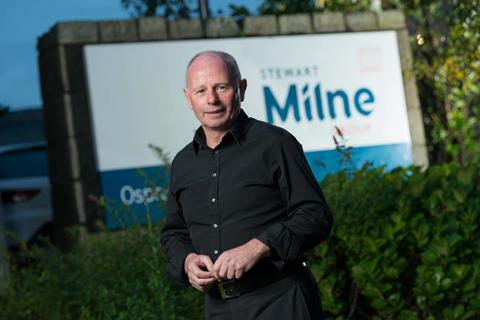Housebuilder shopped to 50 prospective buyers in failed sale effort
Stewart Milne Group went down owing the Bank of Scotland £107.9m, an administrators’ report has revealed.
The housebuilder ceased trading upon the appointment of administrators Teneo Financial Advisory on 8 January, having failed to find a buyer for the businesses.

Bank of Scotland had been the group’s main financial backer in the years up to its collapse, with a term loan and a working capital facility totalling £115m.
The facility was drawn to a lower amount by the date of the administrators’ appointment, but interest on the debt is still accruing.
Teneo’s report described how, in its final years of trading, Stewart Milne had pursued a sale as it struggled to meet its debt obligations to the bank.
>> How and why Stewart Milne collapsed: analysing the numbers
“In December 2021, facing a forthcoming debt maturity, the SMGL Directors sold the Group’s timber frame business – SMTS – generating proceeds of £62m which were applied as repayment of BoS debt,” the report said. “At this time, the BoS facilities were extended through to April 2023”.
“A subsequent M&A process was initiated in April 2022, aimed at achieving a sale of the group.
“The process was concluded in December 2022 and did not result in a transaction, partly due to the extent of the group’s contingent obligations in respect of legacy construction projects and the general economic”
The directors again considered restructuring options in early 2023, concluding that pursuing another M&A process provided “the best prospects of meeting the Group’s liabilities in full”.
Stewart Milne Group was shopped around to roughly 50 parties after this process was launched in May 2023.
However, the administrators explained that “due to the challenging market backdrop, reduced net asset value of the Group, and the Group’s contingent liability position, the process did not result in a deliverable transaction”, and the process was concluded on 3 January.
As well as the Bank of Scotland, the group owes £184,000 to two creditors relating to overage on the Monarch’s Rise site.
The group, which was established in 1975, does “not have material trade debtors” but the administrators have identified tax debtors and other loans that they could realise value from.
A large part of the administration process will consist of selling the group’s land and partially completed developments.
Stewart Milne Group had 10 partially completed residential developments in Scotland, as well as 12 non-operational land sites and 42 contractual options to purchase land.
The group had 329 employees when it entered administration and according to Teneo’s report 208 of these are entitled to ordinary preferential claims, which are amounts owed to employees for arrears of wages/salaries, holiday pay, and pension contributions.
It is estimated that these claims will amount to £0.2m and that there may be sufficient funds available to enable these to be paid in full.
HMRC’s secondary preferential claim of around £1.8m, in respect of PAYE, employee NICs and CIS deductions, may also be paid according to the report.
But the group’s 1,375 unsecured creditors, who are owed nearly £154m, are “unlikely” to be get their money back. Teneo said it expected the amount claimed by unsecured creditors to rise as more come forward.
BDO LLP is currently carrying out the administration of Stewart Milne Homes North West England (Developments) Limited, another entity within the wider corporate group, having been appointed on 12 January 2024.











No comments yet